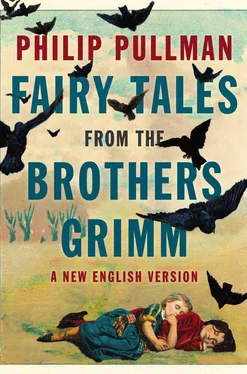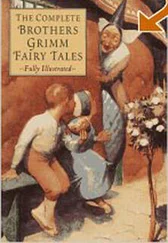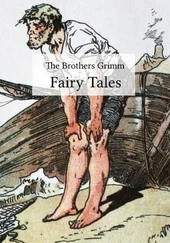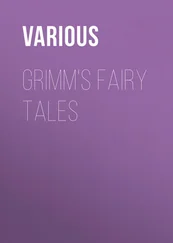But none of those huntsmen came back, and nor did any of the hounds from the pack they took with them. From that day on, no one dared to go into the forest, and it lay in deep silence and solitude, and the only life that was seen was an occasional eagle or hawk flying above the trees.
For many years things remained like that, until one day a huntsman no one knew, a stranger, presented himself to the king saying he was looking for a job, and volunteered to go into the dangerous woods. However, the king didn’t allow him to go.
‘There’s something uncanny in there,’ he said. ‘The place is probably under a spell. I don’t see how you can do any better than the others; I’m afraid you’d get lost like them.’
But the huntsman said, ‘I’m willing to risk it, your majesty. I know nothing of fear.’
So the huntsman set off with his hound into the forest. It wasn’t long before the hound picked up a scent and started to follow it, but he hadn’t run more than a few steps when he came to the edge of a deep pool and could go no further.
Then a naked arm reached up out of the water, seized the hound and dragged him below the surface.
When the huntsman saw that, he went back and got three men to go with him and bring buckets to empty the pool. They did so, and when it was nearly empty they found a wild man lying on the bottom. His skin was brown like rusty iron, and his hair hung down over his face and fell right to his knees. They bound him tightly with ropes and led him away to the castle.
Everyone was amazed to see the wild man. The king ordered him to be put into an iron cage in the courtyard, and forbade anyone to unlock the door of the cage, on pain of death; and he gave the key into the care of the queen herself. From that time on, people could go safely into the forest again.
Now the king had a son who was eight years old. One day he was playing in the courtyard when his golden ball bounced through the bars and into the wild man’s cage.
The boy ran over to it and said, ‘Give me my ball.’
‘Not until you open the door for me,’ said the wild man.
‘No, I can’t do that,’ said the boy. ‘Papa’s forbidden it.’
And he ran away. Next day he came back and asked for his ball, but the wild man only said, ‘Open my door.’ Again the boy refused.
On the third day, when the king had gone out hunting, the boy came to the cage and said, ‘Even if I wanted to, I couldn’t open your cage. I haven’t got the key.’
The wild man said, ‘It’s under your mother’s pillow. You could easily get it.’
The boy desperately wanted his ball back, so he threw caution to the winds and got the key. The lock was hard to turn, and the boy pinched his finger; but when the door was open the wild man came out, gave the boy his ball, and hurried away.
The boy was frightened. He cried out, ‘Oh, wild man, don’t run away, or they’ll beat me!’
The wild man turned back, picked the boy up and set him on his shoulders, and strode off quickly towards the forest.
When the king came home he noticed the empty cage and asked the queen at once what had happened. She didn’t know anything about it, so she looked for the key, and found it gone. Then they realized the boy was missing, and called him, but no one answered. The king and the queen sent servants to look in the royal park around the castle, and in the fields and meadows beyond, but they didn’t find the boy; and then his parents guessed what had happened, and the court fell into deep mourning.
Once the wild man had reached the dark forest he set the boy down and said, ‘You’ll never see your father and mother again. But I’ll look after you, because you set me free, and I feel sorry for you. Do as I tell you, and everything will be all right. I’ve got plenty of treasure and gold, more than anyone else in the world, in fact.’
He gathered some moss and made a bed for the boy, who soon fell asleep. Next morning the wild man led him to a spring and said, ‘See this? This is my golden spring. It’s clear and bright, and I want it to stay like that. You sit here and guard it, and make sure nothing falls in that shouldn’t, because I don’t want it polluted by anything at all, you understand? I’ll come back every evening to see if you’ve done as I tell you.’
The boy sat down at the side of the spring, and watched the water. Sometimes he saw a golden fish or a golden snake deep down under the surface, and he took care to let nothing fall in. But as he sat there, the finger that he’d pinched in the cage door began to hurt so badly that he couldn’t help dipping it into the water. He pulled it out again at once, but he saw that it had turned to gold, and no matter how hard he tried to wipe it off his skin, it was gold all through.
That evening when Iron Hans came home, he looked at the boy and said, ‘What’s happened to the spring?’
‘Nothing, nothing,’ said the boy, holding the finger behind his back so Iron Hans couldn’t see it.
But the man said, ‘You’ve dipped your finger in the water. Well, I’ll let it go this time, but be very careful you don’t let anything else fall in.’
Early in the morning the boy got ready and went to the spring to keep watch. His finger hurt again, and this time he rubbed it across his head; but as he did so a hair unluckily fell out into the water. He snatched it out as quickly as he could, but it was already covered in gold.
By the time he came home, Iron Hans already knew what had happened. ‘You let a hair fall into the spring,’ he said. ‘That’s the second time. I’ll overlook it just once more, but if it happens again the spring will be polluted, and you won’t be able to stay here any more.’
On the third day the boy sat there carefully and didn’t move his finger, no matter how much it hurt. But the time went by very slowly, and for want of anything else to do, he bent over and looked at his reflection in the water. He bent his head lower and lower, trying to see his eyes, and then his long hair fell forwards from behind his head and down into the water. He jerked his head back at once, but it was too late: all his hair had turned gold, and it shone like the sun. You can imagine how frightened the poor boy felt. The only thing he could think of was to wrap his handkerchief around his head so that Iron Hans wouldn’t see it.
But of course as soon as he came home, that was the thing he noticed first of all.
‘Untie that handkerchief,’ he said.
The boy had to. All his golden hair fell down around his shoulders, and he couldn’t even think of an excuse.
‘You’ve failed the test,’ said Iron Hans. ‘You can’t stay here any longer. You’ll have to go out into the world, and there you’ll learn what it feels like to be poor. But you’re not a bad boy, and I wish you well, so I’ll grant you one favour: if you’re ever in real need, go into the forest and call out “Iron Hans”, and I’ll come and help you. I’ve got great powers, much more than you think, and more than enough gold and silver.’
So the prince left the forest and wandered along wild paths and well-trodden ones until at last he came to a great city. There he looked for work, but he couldn’t find any, because he’d never learned a trade to earn his living with. Finally he went to the palace and asked if they’d give him a job.
The palace officials didn’t know how they could make use of him, but he was a likeable boy, and they took him in. In the end the cook said he could find things for him to do, and set him to carrying wood and water, and raking out the ashes of the fire.
One day when the other waiters were busy, the cook told the boy to carry a dish to the royal table. The boy didn’t want anyone to see his golden hair, so he kept his cap on. Naturally the king was astonished at this, and said, ‘Boy, when you come to the royal table, you must always take your cap off.’
Читать дальше












